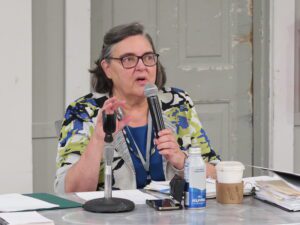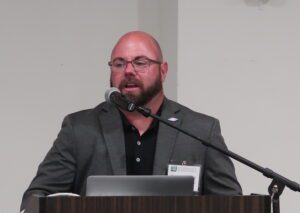Who is a member?
Our members are the local governments of Massachusetts and their elected and appointed leadership.

Attorney Katherine Hesse, founding partner at Murphy, Hesse, Toomey & Lehane, discusses the fundamentals of collective bargaining on Sept. 21 during the Massachusetts Municipal Human Resources Fall Conference in Falmouth.
Collective bargaining, the Peace Officer Standards and Training Commission, transgender and nonbinary employee inclusion, and recruitment and retention were the main topics of the Massachusetts Municipal Human Resources Fall Conference on Sept. 21 and 22 in Falmouth.
The program began with a session on collective bargaining fundamentals led by Katherine Hesse and Mike Maccaro, partners at Murphy, Hesse, Toomey & Lehane. Hesse provided guidance on preparing for the bargaining process, from conducting research to selecting a team.
“People are your most important resource,” she said. “Availability must be a priority.”
Maccaro presented a summary of legal background, case examples, and a practical list of dos and don’ts in collective bargaining.
The day’s second session, led by attorneys Jaime Kenny and Caitlin Morey of Clifford & Kenny, presented an overview of impact bargaining and recent case studies.
A third session was led by POST Commission Executive Director Enrique Zuniga and POST Director of Standards Matthew Lanndry, who provided updates on the commission’s recent work, including the agency portal that launched in May and the disciplinary records published in August.

Trevor Boylston, an LGBTQ+ workplace inclusion coach, discusses how human resources professionals can help build a welcoming workplace culture for transgender and nonbinary employees during the Massachusetts Municipal Human Resources Fall Conference on Sept. 22 in Falmouth.
The second day of the conference opened with the session “Embracing Transgender and Nonbinary Employees in the Municipal Workplace,” led by Trevor Boylston, an LGBTQ+ workplace inclusion coach, and Regina Ryan, president of Discrimination and Harassment Solutions.
Boylston shared his experience as a transgender man working in a corporate environment, and told the story of how he became involved in efforts to develop a transgender and nonbinary-inclusive culture at his own workplace.
Ryan provided legal context, including a summary of laws that protect gender identity and expression, important terms and definitions, and case examples.
The conference ended with a session on employee recruitment and retention. Attendees participated in 15-minute roundtable discussions moderated by fellow MMHR members on four topics: marketing and outreach; benefits and retirement; employee wellness and recognition; and onboarding, training, and professional development. Moderators introduced their topics by sharing their own experiences, then invited attendees to ask questions, share their thoughts, and continue to advance the conversation on post-pandemic employee recruitment and retention strategies.